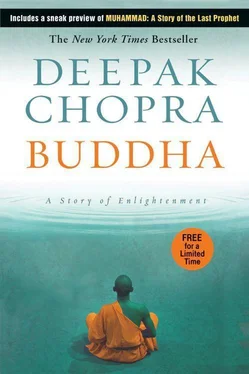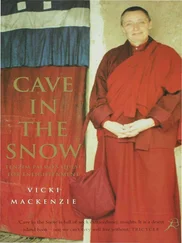When it was finally time, the prince performed two farewell rituals. He went into his wife’s chamber and kissed her while she slept, a bar of soft moonlight across her lips. This was a familiar ritual from the days when he had first begun to ride out before dawn in order to reach poor, faraway villages. The forgotten city had shriveled to nothing, its last feeble cast-offs taken under the prince’s personal care. He had knelt by the bedside of those who had cursed him the first day he rode into the village.
There was one, a withered scarecrow of a woman named Gutta who was as old as Kumbira, a former ladies’ maid overjoyed to come back to the palace. She knew she was there to die. Siddhartha sometimes imagined that Gutta might have been an auntie to him long ago. During her last days he sat vigil, and one night he trusted her enough to ask, “Does it hurt to die?”
She shook her head. “Not as much as you’re hurting.”
“Why am I hurting?”
“How should I know?” The withered old maid had always been crabby, he knew, and dying hadn’t sweetened her temper. After a moment she said, “I’m luckier than you. I’m throwing off my burden, but you keep adding more to yours.”
“Is that what you see?” He had heard that the dying told the truth and even had prophetic powers.
She snorted. “Everybody does. Just look at you. You’re kind, but you think it’s not enough. You give to the poor and sick, but you don’t feel happy from it.” Her voice grew softer. “You mourn a dead girl there was no hope of finding.”
The prince had looked away, feeling a pang from every word. His mission of mercy began while he was searching for Sujata. It became his custom to lead a pack mule loaded with food, crop seeds, and clothing behind his magnificent white stallion, and the three became a familiar sight in the countryside. For the sake of safety, an armed guard rode behind, but he had made sure that the men kept far back, out of sight.
“What does it say if I ride into a village with soldiers?” he asked his father.
“It says nobody better lay a hand on you,” replied the old king, who wanted to send half the garrison with him.
But his son couldn’t stand the idea of showing people mercy with one hand and a sword with the other. Soon his kindness was the thing that kept him safe. The local thieves and bandits belonged to their own caste of dacoits. Many of them benefited from the food he took to the starving villages, since dacoit families and dacoit relatives lived in them. The younger, headstrong thieves argued that they still had a right to loot any gold a traveler might be carrying, but the elders knew he carried none.
“His type can’t stop himself. If he lays eyes on one colicky baby, he’ll throw all his money on the bed if he has any,” they said, quieting the hotheads.
Siddhartha’s second ritual of farewell had been to kiss his baby son. The boy was four, old enough to have his own room. The prince had taken a candle and tiptoed in. Rahula slept, not curled up in a ball like most children, but facedown with his limbs spread-eagled, as if he was prepared to take flight. He lay like that now, and his father looked at him a long time, then turned away without kissing him. Resolved as he was, regret would have its way. If he wakes up and sees me, I’ll never go.
That night of departure Channa drove a chariot to protect Siddhartha, but instead of standing behind him the way he would in battle, the prince rode Kanthaka, who was old but still strong.
When the gates of Kapilavastu closed behind them and they hit the main dirt road, Kanthaka’s hoofbeats became a dull thud, like muffled drums at a funeral. They moved slowly toward the river. Channa’s back was rigid with anger; he refused to break his sullen silence. By sunrise the prince was bathing in the green, slow-flowing river. He stepped out and wrapped a saffron skirt around his waist.
“What do I do with those?” asked Channa. He pointed at the embroidered robe and silk shirt hanging from a tree limb. There was no need to give him instructions-royal finery was burned after it was discarded. Channa just wanted an excuse to pick a quarrel.
“It’s a waste to burn them if you’re really coming back,” he said. “Or did you just tell her that?”
Siddhartha ignored the jibe. “Do what you want. They belong to someone who isn’t me anymore.” He took out a short-bladed razor and began to cut his long hair as close to the scalp as he could.
“Isn’t you anymore?” Channa shook his head with disbelief. He had no idea why Siddhartha had gone crazy, only that he had.
Siddhartha continued quietly cutting his hair. He hadn’t reckoned on how much sorrow he would create around him by deciding to leave. His father fumed and screamed at the servants. Channa whipped the chariot horses too hard. Smiling court ladies acted vaguely as if they’d been jilted. What they really felt, deep inside, was that he had died.
Siddhartha held out the razor to him. “Do you mind?” he said. Channa looked startled. “You’ve done so much for me, friend. This is the last thing I’ll ask.” Siddhartha pointed at the back of his head, where he had made a mess of cutting his hair. Channa reluctantly took the blade. He squatted beside Siddhartha on his heels and began to cut. He was expert at it. This was something that women didn’t do. Barbering was left to men, and on the battlefield soldiers would trim off hair that was too long to fit under a helmet.
At first he was rough, and Siddhartha, saying nothing, gave him a questioning look. “Sorry,” Channa mumbled. After a moment he began to settle down. The intimate act distracted him from his grief. Channa knew, as everyone at court did, that only he was allowed to touch the prince-tapping his shoulder to make a point in argument, brushing dirt off his hunting jacket, embracing him when Siddhartha rode off to the villages-but no one openly spoke about this breach of caste rules.
“That’s enough.” Siddhartha took the razor from Channa’s hands. “I don’t want anyone to think I have an expert barber.”
“No, you’re just another monk with hardly a stitch to wear,” Channa said.
They parted there by the river as the sun came over the treetops. Channa refused to say farewell; he kept his arms tightly pinned by his side to deflect Siddhartha’s attempt to embrace him. As Siddhartha walked away, he trained his eyes straight ahead for the first hour. The jungle canopy was fairly dense, even though trees had been cut down to make the road. For a while he hardly knew how he felt, except in the most basic physical ways. His body felt lighter; the slightest breeze ruffled his thin silk shawl and passed coolly over his skin. Being without long hair and heavy robes was exhilarating and unnerving.
Having been a hunter, he knew how to forage for fruit and wild greens; in the past few years he’d spent days on long treks without provisions. But it wasn’t the physical necessities that worried him. To really be Gautama, he would need to find a teacher. There were forest hermitages scattered over the countryside, most of them near big villages and towns. Saffron-robed beggars had become a common sight on the wide streets of cities beyond the kingdom of Sakya. Their increasing numbers baffled people, and the priests muttered about shiftless pretenders. Some kind of spiritual ferment was taking hold. Before he left home, Siddhartha was intrigued by this new movement, which didn’t even have a name yet.
“It’s young rascals, these so-called holy men,” a silk merchant complained. “They fear work like the plague. They’re abandoning the farms and turning away from their parents. Nothing seems to hold them back, certainly not respect.”
The merchant kept his own son tied close to his side with constant demands and a trickle of money, not enough for him to leave or to get married before the father arranged a match.
Читать дальше












